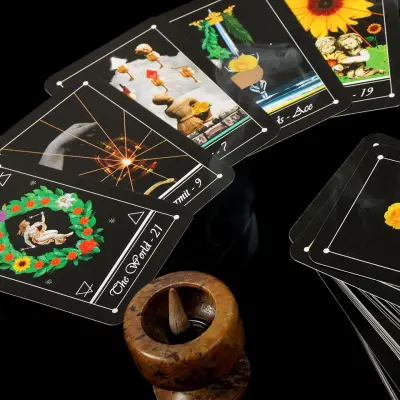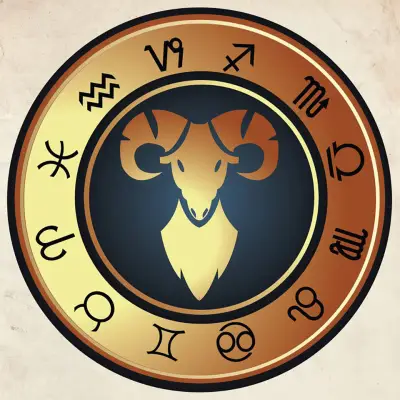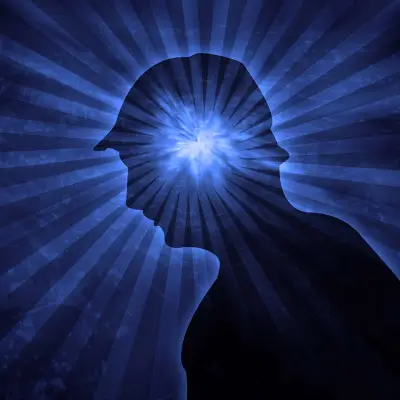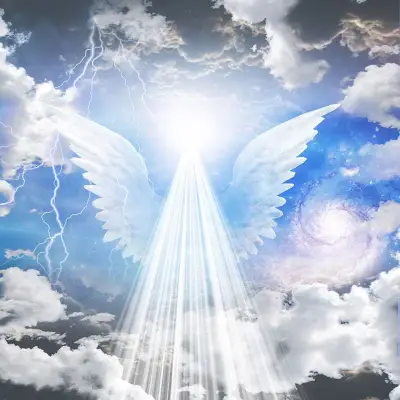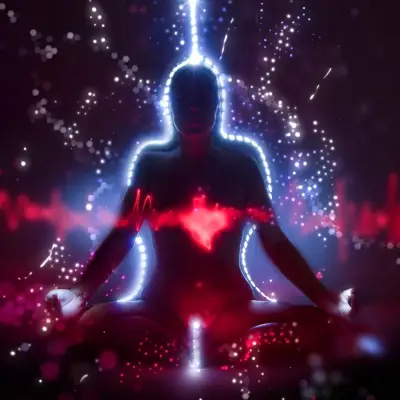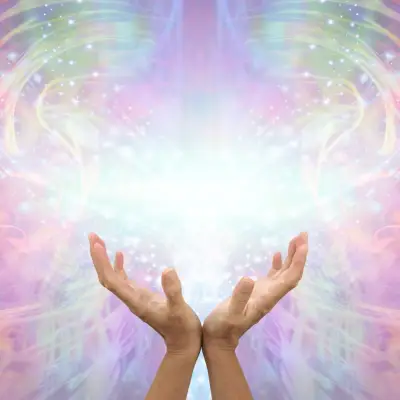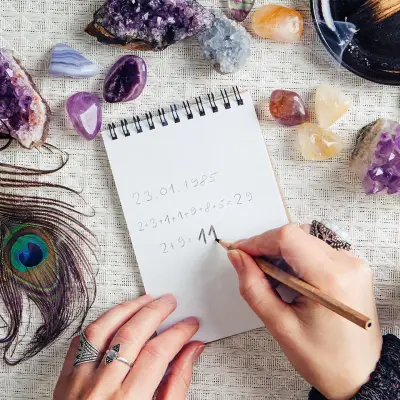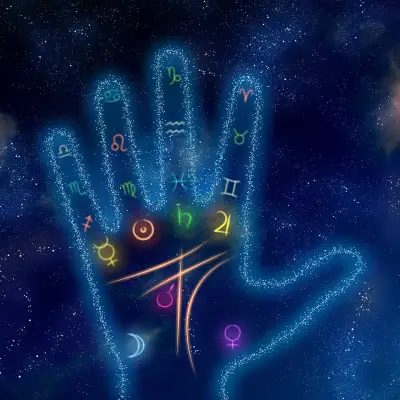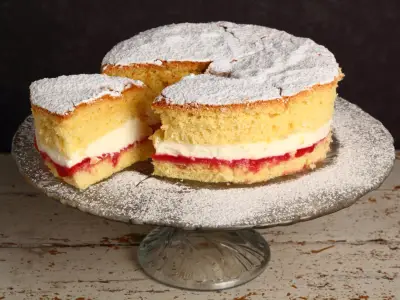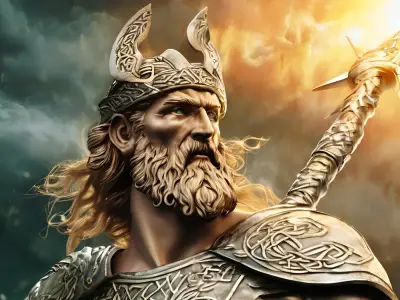In a world filled with questions about spirituality, many find themselves drawn to practices that offer a sense of connection with nature, mystery, and inner harmony. Wicca, often called the "Craft," and the use of "magick" (spelled with a 'k' to distinguish it from stage magic) have captivated people across cultures for years.
For those interested in discovering more about this spiritual path, understanding Wicca's beliefs, rituals, and symbols can offer a doorway into a world of nature-based spirituality, personal growth, and a deeply respectful view of life. This comprehensive shares the essentials of Wicca and modern magick, exploring key concepts, answering common questions, and giving you a well-rounded understanding of this unique way of life.
Jump to:
- What is Wicca?
- The History and Origins of Wicca
- Wiccan Beliefs and Principles
- Wicca and Magick: What’s the Difference?
- Wicca and the Elements
- Who are the Wiccan Gods and Goddesses?
- Wiccan Rituals and Practices
- Symbols in Wicca: What They Mean
- The Wiccan View of Magick
- Types of Wicca Traditions
- Wiccan Tools and Their Uses
- Celebrating the Wheel of the Year
- Modern Wicca and Its Growth
- Wicca in Everyday Life
- Wiccan Myths and Misconceptions
- Is Wicca Right for You?
- Frequently Asked Questions About Wicca
- Study Wicca for £29
Recommended for you!
Best SellersWhat is Wicca?
Wicca is a modern pagan, nature-based religion that draws inspiration from various ancient practices. It celebrates the divine in nature, with many Wiccans practising rituals that honour the changing seasons, lunar cycles, and elements of earth, air, fire, and water. Central to Wicca is the belief in a balance of energies, represented by the Goddess and God, often symbolising the feminine and masculine aspects of the universe.
Wicca can be highly individualistic; some may follow specific traditions, while others develop their own personal practices. Although Wicca draws on ancient beliefs, it has evolved into a modern spiritual path that encourages people to find harmony within themselves and the world around them.
The History and Origins of Wicca
Wicca, as it’s practised today, has relatively recent origins, yet it draws on age-old pagan and folkloric traditions. It was brought to public attention in the 1950s by Gerald Gardner, a British occultist and writer, who is often considered the "father of modern Wicca." Gardner was influenced by various sources, including ceremonial magic, ancient pagan beliefs, and British folklore, creating a synthesis that became known as Wicca.
Gardner’s work gained momentum, and other influential figures, like Doreen Valiente, contributed to the development of Wiccan liturgy and practice, shaping it into a modern path with deep respect for nature and a focus on personal growth.
Through Gardner’s and Valiente’s influence, Wicca evolved into a distinct spiritual path that gained followers and inspired a range of traditions. From its beginnings in Britain, Wicca spread globally, adapting to various cultures while maintaining its core values.
Wiccan Beliefs and Principles
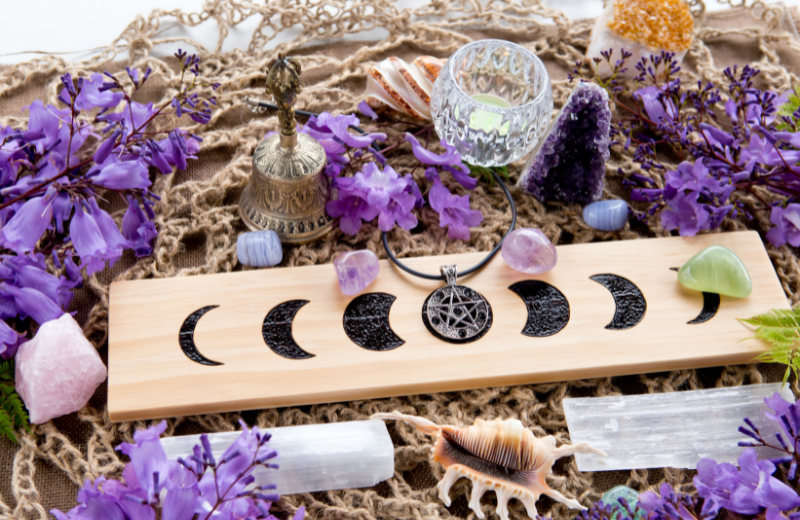
The core belief in Wicca is the Wiccan Rede, which says, "An it harm none, do what ye will." This ethical guideline encourages followers to avoid causing harm to others, oneself, or the natural world. It’s a principle rooted in respect, freedom, and accountability, where you’re free to explore and practice as you choose, provided it doesn’t bring harm.
Wiccans also believe in the Threefold Law, which states that whatever you send out, whether positive or negative, will return to you threefold. This karmic-like principle serves as a reminder of the impact your actions can have, encouraging mindfulness and intentionality in all aspects of life.
Wiccans do not have a strict set of beliefs about the afterlife. Some believe in reincarnation, while others consider the afterlife a spiritual realm or simply a mystery. Regardless, Wicca places greater emphasis on living harmoniously in the present.
Wicca and Magick: What’s the Difference?
Wicca and magick are often linked but are not the same. While Wicca is a religion, magick is the practice of influencing the natural world through intention and ritual. Magick in Wicca is about working with natural energies to bring about positive change. This might include rituals, visualisation, and the use of symbols like crystals, herbs, or candles to set intentions.
Wiccan magick isn’t about supernatural powers; it’s seen as a way of focusing your energy and intentions in alignment with nature. This can be as simple as lighting a candle to represent hope or as elaborate as performing a ritual under the full moon for personal growth. The purpose is to create a connection between the practitioner and the forces of the universe, aligning your desires with natural cycles and energies.
Wicca and the Elements
Central to Wiccan belief and practice are the four classical elements: earth, air, fire, and water. Each element symbolises a fundamental aspect of the natural world and plays a role in Wiccan rituals and magickal workings.
- Earth: Representing stability, grounding, and the material world, earth is associated with physical strength and endurance. It’s often symbolised by soil, rocks, and plants.
- Air: Air embodies thought, communication, and intellect. It’s connected to freedom and inspiration, often represented by feathers or incense smoke.
- Fire: Fire symbolises transformation, passion, and energy. It represents personal will and power, usually symbolised by candles or flames.
- Water: Water is the element of emotion, intuition, and healing. It reflects the flow of life and is symbolised by water itself, such as rivers or seashells.
These elements are often invoked in rituals to bring balance, focus intentions, and honour the interconnectedness of life.
Who are the Wiccan Gods and Goddesses?
In Wicca, the divine is often represented by a Goddess and God, symbolising the feminine and masculine energies of the universe. These figures can take on many forms, drawing from pagan mythology and ancient deities. The Goddess, often associated with the moon, is seen as nurturing, protective, and representative of creation. The God, linked with the sun, embodies strength, vitality, and growth.
Many Wiccans also honour specific pagan gods and goddesses from ancient traditions, such as Celtic, Norse, or Egyptian pantheons. However, Wicca doesn’t dictate specific deities to worship, allowing individuals to connect with those that resonate personally. For many, the God and Goddess simply represent the balance of energies within the natural world rather than being specific beings.
Wiccan Rituals and Practices
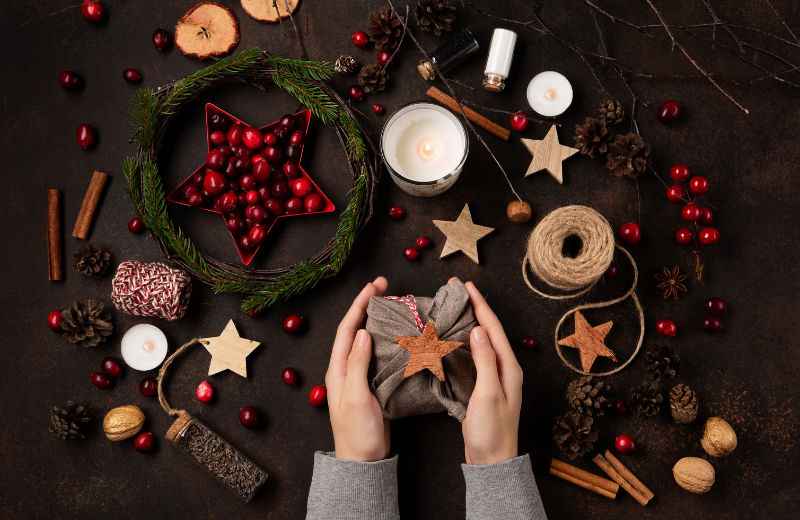
Wiccan rituals are often performed to celebrate nature’s cycles and honour the divine. Key rituals include Sabbats and Esbats. Sabbats mark seasonal festivals, such as the solstices and equinoxes, which align with the cycles of the sun and the changing seasons. Esbats, on the other hand, celebrate the lunar cycle, typically on the full moon, as many Wiccans feel the moon’s energy is at its peak during this time.
Other common practices include casting circles for protection, meditation, and crafting spells. Spells are often simple and symbolic, using items like herbs, crystals, or written words to focus your intent. It’s essential to note that Wiccan spells are rooted in the Wiccan Rede, focusing on positive intent and avoiding harm to others. Wiccans may also keep a Book of Shadows, a personal journal for recording spells, rituals, and experiences, which serves as a record of their spiritual journey.
Symbols in Wicca: What They Mean
Wicca is rich in symbols that hold deep spiritual meaning. Some of the most recognised symbols include:
- Pentacle: A five-pointed star within a circle, representing the elements of earth, air, fire, water, and spirit. It’s a powerful symbol of protection and balance in Wicca.
- Moon Phases: The moon holds significant symbolism, representing the cycles of life, change, and intuition. Each phase of the moon is thought to hold different energies, which Wiccans align with for specific rituals.
- The Triple Goddess: Represented as the Maiden, Mother, and Crone, the Triple Goddess symbolises the three stages of womanhood and the cycles of birth, life, and death.
- Athame: A ceremonial dagger used in rituals for directing energy, not for physical cutting.
The Wiccan View of Magick
In Wicca, magick is viewed as an extension of your will and energy. It’s not about defying natural laws but working in harmony with them to bring about desired changes. Wiccan magick might involve meditation, visualisation, or using objects from nature, such as herbs or stones, to enhance intentions. Many Wiccans practise magick to promote well-being, protect loved ones, and attract positive opportunities.
While the perception of magick as "powerful" may intrigue some, Wiccans see it as part of everyday life rather than a form of supernatural power. Magick works through personal belief, focus, and harmony with the universe, making it a practice that’s more about self-improvement and spiritual connection than external control.
Types of Wicca Traditions
While Wicca is united by its core beliefs, it includes various traditions that allow for individual expression. Here’s a brief look at some of the most well-known Wiccan traditions:
- Gardnerian Wicca: Founded by Gerald Gardner, this is considered one of the original forms of Wicca. Gardnerian Wicca is initiatory and often involves a formal structure, emphasising secrecy and coven-based rituals.
- Alexandrian Wicca: Developed by Alex Sanders in the 1960s, Alexandrian Wicca shares similarities with Gardnerian Wicca but is generally more eclectic and inclusive, often integrating other magical systems.
- Dianic Wicca: This tradition focuses on the worship of the Goddess and is largely practised by women. Dianic Wicca highlights feminine spirituality and is sometimes referred to as “feminist Wicca.”
- Eclectic Wicca: Eclectic Wiccans draw from various sources and traditions, customising their practices to fit personal beliefs. This form of Wicca is often solitary and flexible, making it accessible to those exploring Wicca individually.
Wiccan Tools and Their Uses
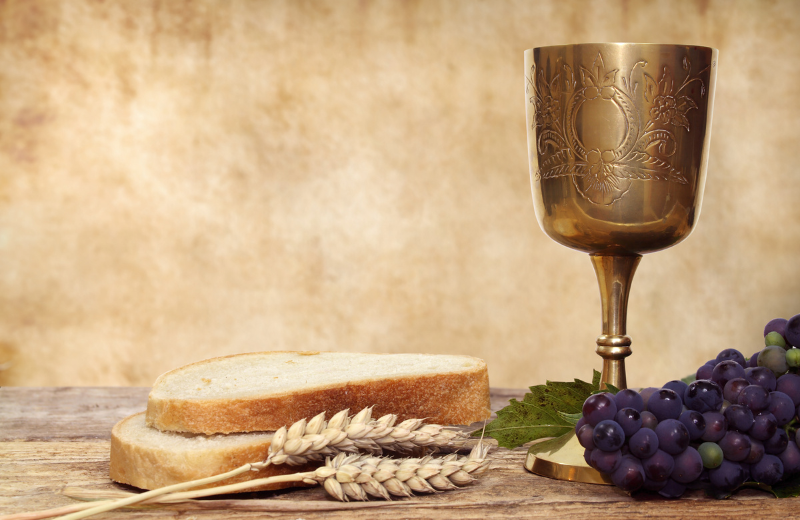
Wicca uses various ritual tools, each serving a specific purpose and helping practitioners connect with their intentions and the energies they’re working with. Here are some of the most common Wiccan tools:
- Athame: A ceremonial dagger used to direct energy during rituals. It’s a symbolic tool, not used for physical cutting, and is often associated with the element of air.
- Wand: Used to channel energy, especially in spells or blessings, the wand can be crafted from different woods, each with its symbolic meanings.
- Chalice: Representing the element of water, the chalice is often used to hold liquids during rituals, symbolising intuition and the nurturing aspect of the Goddess.
- Pentacle: A five-pointed star within a circle, representing the elements and spirit, symbolising balance, protection, and unity.
These tools aren’t essential but are often used to enhance focus and provide structure during rituals, helping practitioners feel connected to their intentions and the natural elements.
Celebrating the Wheel of the Year
Wiccans honour the natural cycles through eight seasonal festivals known as the Wheel of the Year. Each of these festivals, or Sabbats, aligns with the earth’s changes and represents different stages of growth, harvest, and rebirth.
- Samhain (31st October): Known as the Wiccan New Year, Samhain marks a time to honour ancestors and reflect on the cycle of life and death.
- Yule (Winter Solstice): Celebrates the rebirth of the sun and the return of light, symbolising hope during the darkest days of the year.
- Imbolc (1st February): A festival of light and new beginnings, Imbolc celebrates the first signs of spring.
- Ostara (Spring Equinox): Marks the balance between light and dark, symbolising growth and renewal as spring unfolds.
- Beltane (1st May): A celebration of life and fertility, Beltane honours love, passion, and the blossoming of nature.
- Litha (Summer Solstice): The longest day of the year, Litha celebrates the sun’s peak and the fullness of life.
- Lammas/Lughnasadh (1st August): Marks the beginning of the harvest season and gratitude for the earth’s abundance.
- Mabon (Autumn Equinox): Symbolises balance and thanksgiving as the days begin to shorten and autumn deepens.
These festivals help Wiccans stay attuned to the rhythms of nature, honouring each phase of life and reflecting on their own growth.
Modern Wicca and Its Growth
Wicca has grown significantly since its emergence in the 20th century and is considered one of the fastest-growing religions in the UK. People are often drawn to Wicca for its inclusivity, flexibility, and respect for nature. Unlike many religions, Wicca has no central authority or rigid doctrines, allowing people the freedom to explore spirituality in a way that resonates with them.
The modern Wiccan community includes diverse practitioners, from solitary witches to covens who gather for group rituals. This flexibility is appealing to those who appreciate spirituality as a personal journey rather than a strictly defined set of rules.
Wicca in Everyday Life

In addition to formal rituals, Wiccans incorporate their beliefs into daily life in meaningful and simple ways. Here are some everyday practices that align with Wiccan principles and can be incorporated by anyone:
- Mindful Nature Walks: Spending time in nature, whether in a park or a forest, can be a way of connecting with the earth’s energies and appreciating its beauty.
- Gratitude Rituals: Practising gratitude for the earth’s resources, food, water, and shelter reflects a Wiccan value of respect for all life.
- Full-Moon Journaling: Using the full moon as a time for reflection and goal-setting can help align personal intentions with the lunar cycle, a powerful symbol in Wicca.
- Simple Altar Space: Creating a small space at home with symbols of the elements or personal spiritual items can help ground yourself and serve as a daily reminder of spiritual intentions.
These everyday practices allow Wiccans to live in harmony with their values and deepen their spiritual connection outside of formal rituals.
Wiccan Myths and Misconceptions
Several misconceptions surround Wicca, largely due to its association with witchcraft. Common myths include the idea that Wiccans worship the devil or practice "dark" magick. In reality, Wicca is a peaceful religion based on respect, ethical guidelines, and positivity. Wiccans do not believe in a devil figure, as this concept is generally tied to Christian beliefs and doesn’t align with Wiccan teachings.
Another myth is that all witches are Wiccans or vice versa. While Wicca includes witchcraft, not all witches follow Wicca, and Wicca itself is a distinct religious path that encompasses much more than the practice of magick.
Is Wicca Right for You?
For those interested in learning more about Wicca or adopting some of its principles, the beauty of Wicca lies in its openness. There’s no requirement to believe in specific doctrines or to follow a particular path. Some may explore Wicca out of curiosity, while others may find it becomes a significant part of their spiritual life.
If you feel drawn to Wicca, consider learning more about its history, values, and practices. Resources such as books, online courses, or local pagan groups can provide insights and guidance as you explore this unique spiritual path.
Recommended for you!
Best SellersFrequently Asked Questions About Wicca
How do I start practising Wicca if I’m completely new?
Begin by reading reliable resources about Wicca, like books or online courses. You could start by observing nature’s cycles, celebrating the moon phases, and journaling your experiences. Practising Wicca is often a gradual journey, so taking your time to explore its beliefs and values is encouraged. Consider learning about meditation, grounding, and working with the elements as an initial step.
Can I practise Wicca if I don’t belong to a coven?
Many Wiccans choose to practise as solitary witches and develop their own personal routines. Solitary Wicca allows for flexibility, letting individuals tailor their practices and rituals to suit their unique beliefs and lifestyles. Some people may eventually join a coven, but it’s not necessary for a fulfilling Wiccan practice.
Are there any specific tools or items I need to practise Wicca?
While some tools, like an athame, wand, or chalice, can enhance rituals, they aren’t strictly necessary. Many Wiccans use everyday objects or nature-based items such as stones, feathers, or candles. The focus in Wicca is on intent and connection rather than on expensive or elaborate items.
Can Wiccans have different beliefs about the afterlife?
Beliefs about the afterlife vary among Wiccans. Some believe in reincarnation, while others view the afterlife as a spiritual realm or as an unknown mystery. The focus in Wicca is on living harmoniously in the present rather than following a specific doctrine about the afterlife.
Do Wiccans celebrate mainstream holidays like Christmas?
Some Wiccans celebrate mainstream holidays with their families or friends, while others may focus solely on the Wiccan Wheel of the Year festivals. Many Wiccans are flexible and see these celebrations as opportunities for connection rather than as conflicts with their beliefs.
Is Wicca suitable for children and families?
Wicca’s respect for nature and ethical principles can make it accessible to families. Some Wiccan parents involve children in simple nature-based activities or seasonal celebrations, like planting trees or observing the moon. Wicca’s flexibility allows families to adapt practices in ways that feel comfortable and age-appropriate.
Is Wicca recognised as a religion?
Wicca is recognised as a religion in many countries, including the UK and the US. Wiccans have the same rights to religious freedom as other faiths, and Wicca is often recognised in legal and social contexts as a legitimate spiritual practice.
Study Wicca for £29
If you’re intrigued by the Wiccan path and want to learn more about this fascinating spiritual journey, consider the Wicca Diploma Course from Centre of Excellence. This course offers an in-depth exploration of Wiccan beliefs, practices, and symbols, guiding you on a path of personal growth and understanding. Enrol today to gain access to the course for a discounted price of £29 and start your journey into the world of Wicca.

